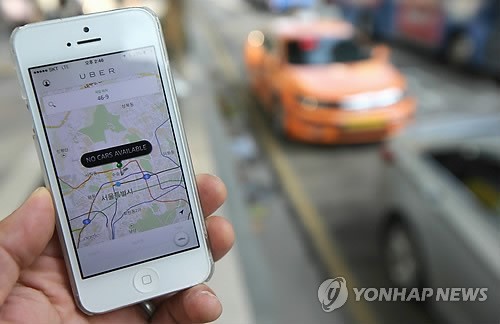 |
| (Yonhap) |
A rift between taxi hailing service operator Uber Technologies and the Seoul Metropolitan Government is expected to deepen on the city government’s decision to push ahead with an ordinance rewarding those alerting authorities of Uber cabs.
The city government will send the bill for the ordinance to Seoul City Council for approval on Friday. On Thursday, the taxi hailing service operator issued a statement lambasting the situation.
“We urge the Council to reject this ordinance on the grounds that it contradicts the city’s sharing economy policies, undermines the city’s efforts to attract foreign investors, discriminating against Uber while the City actively supports (and invests in) companies offering similar services,” said the California-based firm in a press release.
The city government is planning to introduce its own taxi haling services next year in a joint effort with Daum Kakao, the operator of mobile messenger Kakao Talk.
According to the proposed bill, the city will not only offer cash rewards to those notifying the city of Uber taxies, but also confiscate the private vehicles mobilized for the service. The move, industry watchers said, signals that Seoul is taking the steps to kick Uber out of the country.
“I cannot see how this ordinance serves the interests of Seoul citizens. It leads us to question that the City’s officials are bowing to pressure from taxi associations which have declared war on competitors,” said Allen Penn, the head of Asia operations for Uber, expressing his disappoint against the city government.
“Seoul is a renowned high-tech, and sharing economy city. That was why it was chosen as one of our first cities in Asia for Uber.” he added.
Uber Korea, which launched UberBLACK for luxury chauffeur services in Seoul, has recently began UberX, which allows any individual who owns cars can utilize their vehicles for car sharing, last month.
Threatened by the steadily growing popularity of the car-sharing services, local taxi associations have staged a series of protests against the smartphone-based car service while wielding their considerable lobbying influence in local political and administrative circles.
By Kim Young-won (wone0102@heraldcorp.com)

